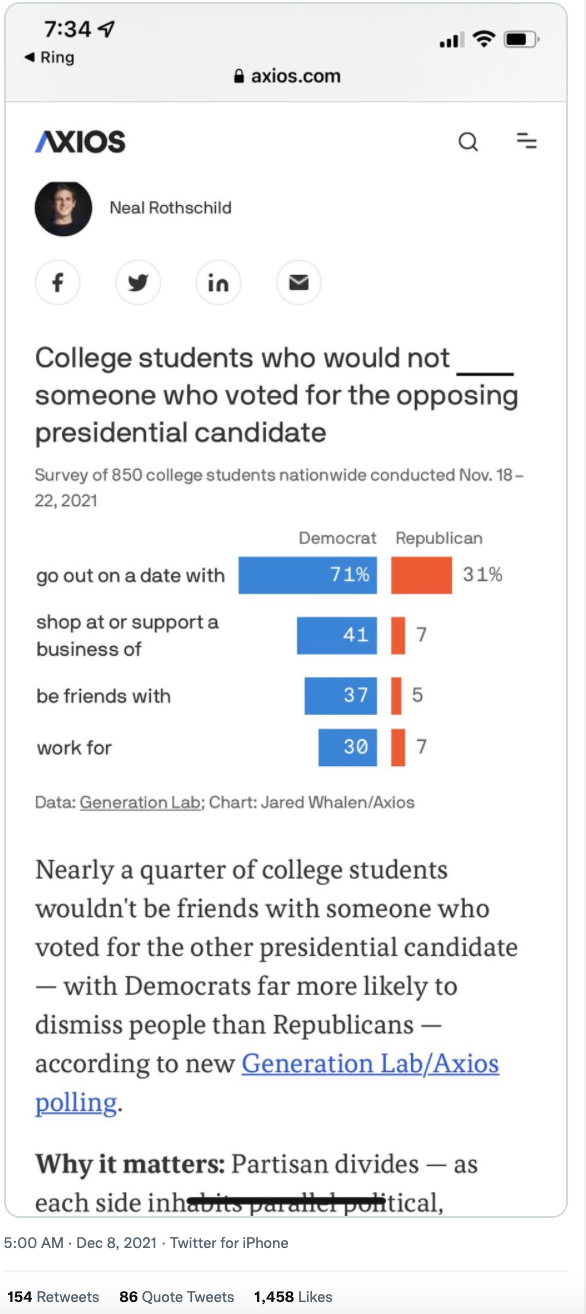Are they really your friend?
18 December 2021
The other day, Joe Scarborough, conservative television presenter for MSNBC, tweeted the above picture of a poll conducted by Axios.

Scarborough added,
“My most fascinating friendships have always come from “the other side. In Congress, I was considered one of the most conservative members but I always sat with Democrats and built friendships with John Lewis, Elijah Cummings, Ron Dellums, and Maxine Waters. I always benefited.”
I understand his tweet to mean that he did not shy away from establishing relationships with those who held opposing political views in his day. My problem is that he used the word “friendships” and listed several prominent black Congressional representatives at the time he served in Government. The question is whether those individuals considered their relationship with Scarborough at the time to be a “friendship”. Polling questions are very specific and you must interpret results in the specific context of the question. And in rushing to put forward his anecdotal example, I think Scarborough missed the polling context.
In recent years, commentators like Scarborough have seemed downright reasonable compared to the spittle-flecked blood-crazed, barking Rottweilers who represent U.S. conservative inclinations. But in the Trump era, and even in the Tea Party era of American politics, Scarborough’s perspectives were not pleasant (say nothing for the anemic quality to his commentary). I write this to say that while he may have considered what he had with certain black congress members as friendship, I am not sure those same people thought it was friendship. It was most likely a working relationship and an admirable one, but friendship most likely not. I work with people and have made an effort always to be cordial to facilitate the working environment. But are these friendships? Would they consider me a friend? I am not sure.
The tweet from Scarborough represents a cynical perspective in popular media; that if people will only put aside their differences and work together, the U.S. will heal. It is a perspective, that I think ignores the history of this country. It assumes there was a time, where significant divisions and violence did not exist. It assumes a time in American history where there was no need for healing, while the opposite is true. Perhaps for people like Scarborough, (i.e., white and male), this has indeed been the case, that there was a time when America was the land of opportunity, freedom and strong democratic values. But for black folk, these fault lines have always been clear as day and we have had to navigate those kinds of issues with care and deep thought. The experience and of harm, violence, and the incessant threat to our existence has always necessitated that we act with caution, displaying one face to the public around us, while masking inner concerns.
Take Ronald Reagan for example, the political hero of people like Scarborough. A man caught on tape referring to black people as monkeys1 and commencing his presidential campaign at the Neshoba County Fair by delivering a speech about “States Rights.”2 Does Scarborough think the black politicians like John Lewis who had to work with that man’s ardent supporters considered those supporters friends or his relationship with them as one of “friendship?”
Would Scarborough be willing to form “friendships” with people who referred to people who looked like him using racist slurs in private? Would Scarborough:
- “Go out on a date” with someone who felt he was less than human?
- “Support the business of” someone who sought to end his existence?
- “Be friends with” someone who constantly advocated for policies that were detrimental to his health and well-being and those of his family?
- “Work for” someone who considered him to be less of a man and hence less deserving of the rewards proffered by American society? If I had the choice, I certainly wouldn’t, but perhaps Scarborough is a different person.
Anyway, the poll Joe Scarborough referenced is worth a further look. The poll sought to capture an element of the political divide in the U.S. and asked participants whether they would be willing to establish certain relationships (e.g., friendship, romantic, work, etc.) with those supporting an opposing political candidate. A partial write-up of the results the source of Scarborough’s tweet, may be accessed in an article by Neal Rothschild, Young Dems more likely to despise the other party 3.
Americans, particularly the youth are more cognizant of the injustices and inequalities built into American society. Furthermore, as marginalized populations have gained stronger voices, they are better able to express their needs, the divides that have always plagued the country are clearer. The results of such a poll should not be used to press for the status of quo of ignoring
-
Naftali, Tim. “Ronald Reagan’s Long-Hidden Racist Conversation With Richard Nixon.” The Atlantic, 30 July 2019, https://www.theatlantic.com/ideas/archive/2019/07/ronald-reagans-racist-conversation-richard-nixon/595102/. ↩
-
Reagan, Ronald, and The Neshoba Democrat - Editorial Board. “Ronald Reagan’s 1980 Neshoba County Fair Speech.” The Neshoba Democrat, https://neshobademocrat.com/stories/ronald-reagans-1980-neshoba-county-fair-speech,49123. Accessed 9 Dec. 2021. ↩
-
Rothschild, Neal. “Young Democrats More Likely to Despise the Other Party.” Axios, https://www.axios.com/poll-political-polarization-students-a31e9888-9987-4715-9a2e-b5c448ed3e5a.html. Accessed 9 Dec. 2021. ↩